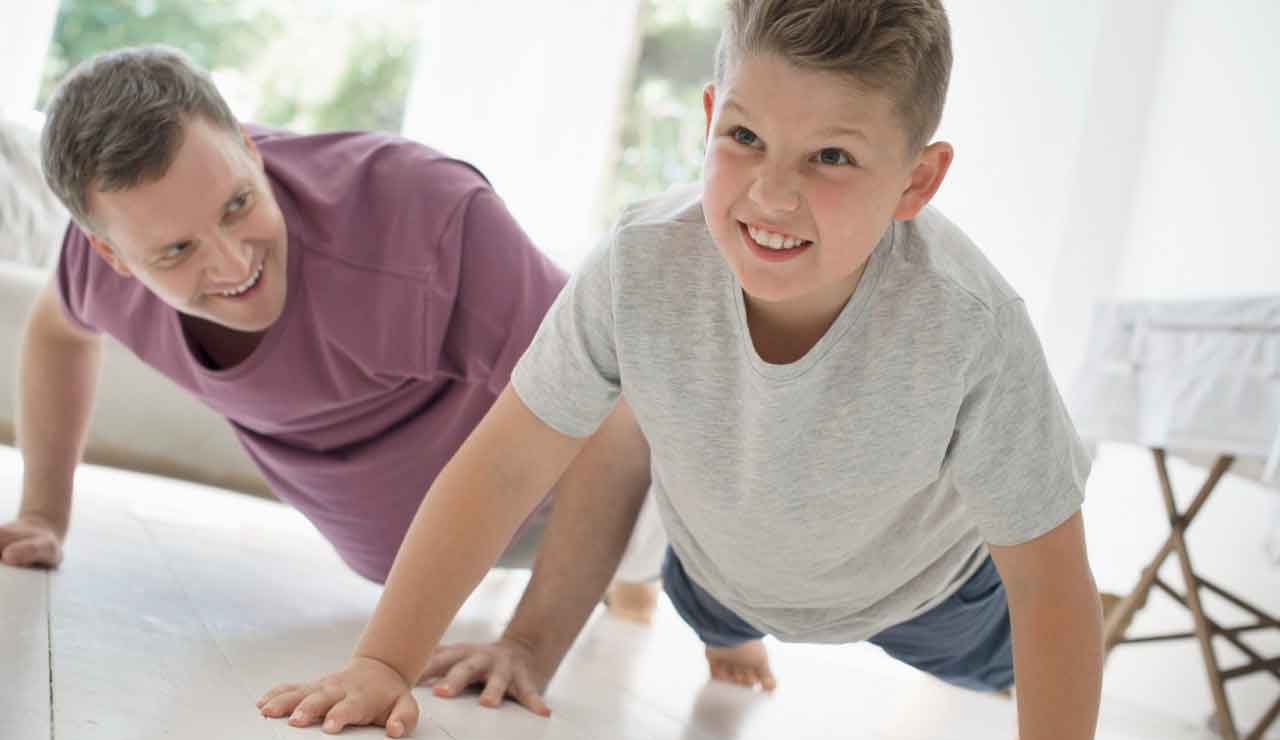Don’t Guilt Trip Your Kids About Exercise

Making your kids feel bad about their sloth-like behavior won’t change it, but encouragement from their peers might.
Sometimes it seems that scientific studies serve to tell you what you might already know intuitively, or through your own “study” involving real life trial and error.
One study serves that purpose by telling you that haranguing your kids into getting more exercise won’t work. You may have already come to that conclusion as they sit in front of video games, trying to ignore you.
The study found that middle-schoolers who don’t feel in control of their exercise choices or feel pressured by adults to be more active “typically aren’t,” according to a University of Georgia (UGA) report.
Conversely, middle-schoolers who can make their own choices about exercise are more likely “to see themselves as a person who exercises, which in turn makes them more likely to exercise.”
RELATED TOPIC: Improve Your Spouse’s Fitness by Example
There’s an old saying that you can lead a horse to water, but you can’t make it drink. That’s essentially what the study found about kids in their tweens.
Kids normally decrease their activity levels by half between fifth and sixth grades, says Rod Dishman, PhD, the study’s lead author and a professor of kinesiology at the UGA College of Education.
“Our results confirm that the beliefs these kids hold are related to physical activity levels,” Dishman said. “But can we put these children in situations where they come to value and enjoy the act of being physically active?”
He and colleagues at the University of North Carolina are looking at ways to help kids identify with exercise at a younger age. That way, by the time they reach middle school, they’ll see themselves as young people who want to exercise.
“Just like there are kids who are drawn to music and art, there are kids who are drawn to physical activity,” Dishman says. “But what you want is to draw those kids who otherwise might not be drawn to an activity.” Or, in other words, make them want to drink of their own accord.
The last thing you should do as a parent is try to guilt trip your kids into exercising. It will backfire, Dishman says, and your kids will be even more unlikely to “embrace activity overall.”
“The best thing is to do it because it’s fun,” Dishman said. “It’s the kids who say they are intrinsically motivated who are more active than kids who aren’t.”
Your kids may respond to encouragement backed with support that isn’t pushy, experts say. That could come from their peers, according to another study. That one offers an alternative to prevailing recommendations that parents should be the ones encouraging their kids to exercise.
“We speculate that the social network of friendships is increasingly important in influencing behaviors as children get older,” said Jessica Graus Woo, MHSA, PhD, lead study author and an associate professor of pediatrics at Cincinnati Children’s Hospital Medical Center in Cincinnati, Ohio.
“Having physically active friends may make it easier for obese children to get involved with activities and lower the perceived barriers for doing so, while having a physically active family may not be as inspiring.”
Still, your kids are going to spend more time around you at that age, so one expert suggests encouraging them to run errands such as “walking to the store, sweeping the sidewalk, or helping to clean out the garage.”
Or, when kids “complain there’s nothing to do, suggest active games such as jumping rope or riding a bike,” says Russell R. Pate, PhD, a professor of exercise science at the University of South Carolina.
Pate also recommends supporting kids who are involved in sports by helping them practice or asking them to show you what they’ve learned, such as new moves. You should also make sure to attend their events and cheer them on.
“Perhaps most important, provide positive reinforcement by praising their accomplishments, rather than focusing on what they do wrong,” he says.
It’s also important to remember that your kids take their lead from you. To borrow another time-honored saying, monkey see, monkey do. That means encouraging your kids to get and stay active by demonstrating your own commitment to exercise, especially when you portray that it’s fun and helps you feel good.
It also helps motivate kids to move when the whole family is doing it together. That can be anything from a family bike ride, to a hike in the woods, or some climbing on an indoor wall.
“Playing with your kids can be the best exercise of all,” Pate says. There are even video-based games that feature movement. One good example is the popular dance move video games offered on every platform and which are performed in friendly competition by two or more players.
If just the word “exercise” turns your kids off, Pate suggests “striking it from your vocabulary and talk about physical activity in terms of fun or play instead.”
“Adults and kids alike are more eager to get moving when it’s enjoyable,” he says. So, run around with them in the back yard, just being silly, or play some of your old rock n’ roll and “teach them the Twist.” If nothing else, they’ll tighten their abs with the laughter that comes with watching you.
Updated:
February 27, 2020
Reviewed By:
Christopher Nystuen, MD, MBA, and Janet O’Dell, RN